MercoPress. South Atlantic News Agency
Tag: Argentina China currency-swap
-
Monday, December 3rd 2018 - 06:42 UTC
China boosts Argentina's foreign reserves with a US$ 9 billion currency swap
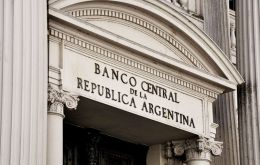
China and Argentina signed a US$ 9 billion currency swap agreement to boost the South American country’s foreign currency reserves, its central bank announced on Sunday.
-
Sunday, December 2nd 2018 - 21:17 UTC
Xi Jinping furthers China's involvement with Argentina during meeting with Macri
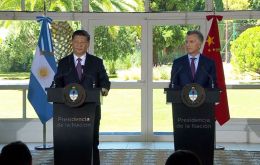
Presidents Mauricio Macri of Argentina and Xi Jinping of China Sunday met in a post-G20 encounter at the former's residence in the outskirts of Buenos Aires to further develop the relations between their two countries.
-
Friday, August 17th 2018 - 08:58 UTC
Argentina struggling to tame markets and inflation; talks for a currency swap with China
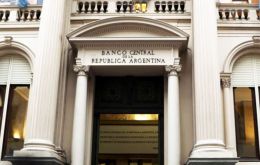
Argentina’s central bank said on Thursday it hiked reserve requirements by 3 percentage points for the country’s largest banks, as it tries to keep its plan for reducing short-term debt from adding to already high inflation.
-
Tuesday, August 2nd 2016 - 06:07 UTC
China's leading role in Argentina reviewed and confirmed by Macri
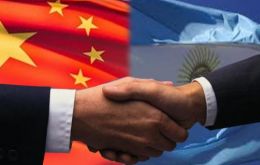
China’s role in Argentina’s foreign relations will be more balanced than during the Kirchner administrations, with a larger role played instead by the United States and European countries, the country’s ambassador to Beijing Diego Guelar said, claiming Chinese investment will have to be more competitive.
-
Thursday, December 10th 2015 - 08:22 UTC
Macri's candidate will head the Central bank from the first day; Vanoli resigns

Argentina Central Bank President Alejandro Vanoli resigned Wednesday under pressure from President-elect Mauricio Macri, who plans to remove currency controls with reserves standing at a nine-year low.
-
Thursday, November 12th 2015 - 08:29 UTC
Kirchners' ex minister claims poverty in Argentina is similar to that of the 2001/02 crisis

Argentina's former Secretary of Culture José Nun said that “current poverty” in the country “is similar to that which preceded the 2001/02 crisis”, and underlined that he “would never vote” for the presidential incumbent candidate Daniel Scioli, who was handpicked by outgoing head of state Cristina Fernandez.
-
Monday, November 2nd 2015 - 09:18 UTC
China's Renmimbi has become world's second most used currency in trade finance
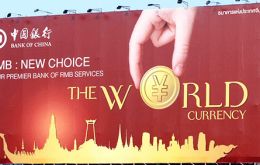
As China establishes itself as the world’s second largest economy and top trading nation, its currency, the renminbi (RMB), is also gaining popularity around the world. According to the People’s Bank of China’s 2015 Renminbi Internationalization Report, the RMB was the world’s 5th most used payment currency, the 2nd most used trade finance currency, and the 6th most traded currency in 2014.
-
Saturday, January 10th 2015 - 06:44 UTC
Argentina's comprehensive strategic (and vital) association with China
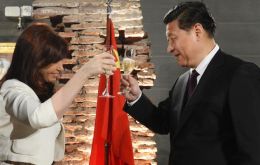
Argentina and China entered a new phase of their relationship in July last year after upgrading it to a “comprehensive strategic association” and signing a battery of agreements, which include a 4.7 billion investment in hydroelectric dams, 2.09 billion in the renovation of the rail system and an 11 billion currency swap.
-
Friday, October 31st 2014 - 08:08 UTC
Chinese relief for Argentina: central banks activate currency-swap

The central banks of Argentina and China on Thursday activated a bilateral currency-swap agreement, which meant that the Argentine central bank received an initial tranche of Yuan equivalent to 814 million dollars.
